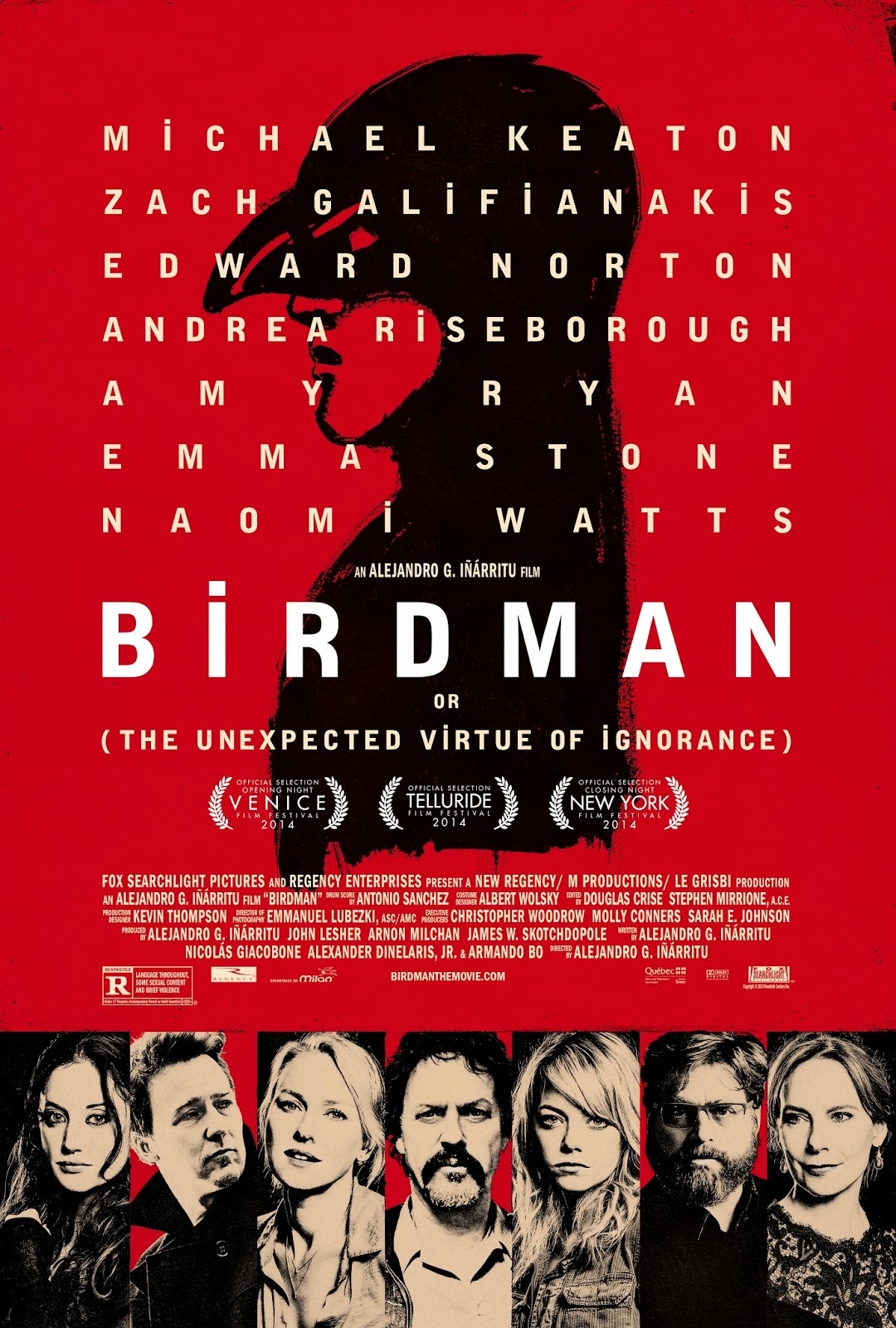As I sat in the theater with the end credits of Birdman scrolling in front of me, I found myself thinking back over all the movies I’ve seen in the past several years—wondering if there is anything even in the same ballpark as what I’d just witnessed.
Inception? Maybe. But that spinning-top ending is still infuriating, all these years later.
Gravity? Possibly. But, as with Inception, the ending.
The nearest I can come is Black Swan, which is still just as haunting now as it was in 2010. And Natalie Portman’s indelible performance is still my gold standard for actresses.
In short, I can’t think of a single movie in recent memory that is so profoundly excellent as Birdman. Powered by Michael Keaton’s mesmerizing and naked (sometimes literally) performance, it stands as the polar opposite to the film I had seen just 24 hours earlier—Dumb and Dumber To. Alejandro González Iñárritu (Babel, 21 Grams) has crafted a movie so completely stunning, so entirely inventive, and so downright awesome (in the true sense of the word) that there’s not much that doesn’t pale in comparison.
Keaton is Riggan Thomson, a washed up, weathered actor who made his fortune and fame in the 90s Birdman trilogy, donning the superhero’s latex suit and mask in a mega-franchise that has since folded. (Art imitating life, much?) He has now thrown his last few dollars and all of this time and effort into a Raymond Carver’s “What We Talk About When We Talk About Love” to Broadway. Throughout its two-hour running time, Birdman unspools as a very “meta” meditation on Hollywood, Broadway, and the life of has-been actors. It’s a biting satire, a hilarious dark comedy, and a heartbreaking character study all in one.
Riggan is still haunted by his former superstar life. (The Ghost of Birdman Past is the ubiquitous voice in his head, and he’s also sporting some nifty telekinetic traits, whether they’re real or imagined—let the debate begin.) He’s also butting heads with the New York Times’ irascible stage critic Tabitha (Lindsay Duncan) and his best friend and producer Jake (Zach Galifianakis), trying to connect with his jaded daughter Sam (Emma Stone), and enduring his hotheaded co-star—revered stage actor Mike Shiner (Edward Norton). Plus, his ex-wife Sylvia (Amy Ryan) and his new girlfriend Laura (Andrea Riseborough) are very much in the mix. Riggan is a man teetering on the brink anyway, and that’s before the show (which hasn’t even made it to opening night yet) starts crashing down around him.
Keaton throws himself into Riggan as he’s never done with any role previously. It’s a powerful, exceptional, and raw performance filled with both grand gestures and intimate nuance. And I won’t pretend that I didn’t find myself wondering where this Michael Keaton guy has been for the last thirty years. Surely this isn’t the same actor who wasted our time as Lindsay Lohan’s father in 2005’s Herbie Fully Loaded?
As flawless as the cast is (and there’s not a single false note between the lot of them), without Iñárritu (who also co-wrote the screenplay) and his cinematographer Emmanuel Lubezki (Oscar winner for Gravity) Birdman would have emerged as merely a solid ensemble piece. With them though, the film is taken to an entirely new level. Lubezki’s camera work is seamlessly transformed to appear as one, single take, and while other films have taken the same approach (Hitchock’s Rope and 2010’s Silent House -and its remake-, for example), it hasn’t been used to nearly the great effect as here. The fluidity propels Birdman forward, creating not only a fast-paced dynamic but also putting us even more in the moment (and in Riggan’s deteriorating mind) than a “traditional” film could have. And Antonio Sanchez’s jarring, percussive score only adds to the beautiful chaos.
By the time Birdman takes us through its crazy/beautiful finale, there’s little denying that we’ve just witnessed some of the most creative film-making and engrossing performances of the year. And, as a bonus, there’s nary a single, infuriating spinning top to be found.
5/5 stars
